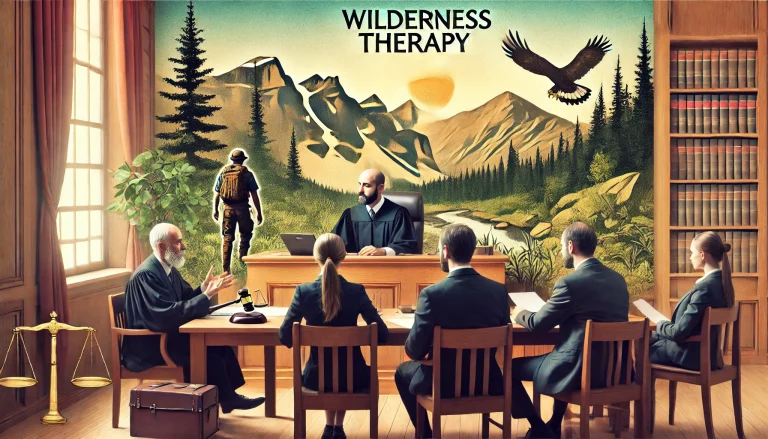Wingate Wilderness Lawsuit Therapy was a wilderness-based therapeutic program located in Utah, designed to help struggling teens. The program combined outdoor activities, such as hiking and rock climbing, with therapeutic support to help young individuals deal with emotional or behavioral challenges. While the approach was innovative, combining adventure with therapy, it also attracted attention due to a major lawsuit that raised questions about safety, legal responsibility, and how such programs are regulated.
Wingate Wilderness Lawsuit: A Turning Point for Wilderness Therapy Programs
The Wingate Wilderness lawsuit became a pivotal moment for wilderness therapy programs, shining a light on safety concerns and legal responsibilities. This case involved Jacob Scott, a participant in Wingate Wilderness Therapy, who was injured during a rock climbing activity. The central question was whether the program’s actions fell under the Utah Health Care Malpractice Act, a law typically reserved for healthcare providers.
The Utah Supreme Court ultimately ruled that Wingate’s services could be classified as health care. This decision expanded the application of malpractice laws to include wilderness therapy programs, making them accountable for participant safety in the same way as traditional healthcare providers. The lawsuit also brought attention to allegations of negligence, such as insufficient staff training and inadequate supervision during high-risk activities.
Beyond the courtroom, the case had a significant impact on the entire wilderness therapy industry. It raised awareness about the need for stricter safety protocols, better staff preparation, and stronger regulatory oversight. The ruling encouraged other states to evaluate their own standards for similar programs, ensuring greater protection for participants.
In 2023, Wingate Wilderness Therapy closed its doors, partly due to the financial and reputational strain from the lawsuit. While the program helped many teens, the case served as a reminder of the importance of prioritizing participant safety and maintaining transparency with families. Ultimately, the Wingate Wilderness lawsuit set a precedent that could shape the future of wilderness therapy for years to come.
The Lawsuit
The most significant legal case involving Wingate Wilderness Therapy was Scott v. Wingate Wilderness Therapy, LLC. The lawsuit was filed by Jacob Scott, a minor, after he was injured during a rock climbing activity as part of the program. Scott’s injury prompted questions about whether the program was legally responsible for the accident.
One of the primary legal issues in the case was whether Wingate’s actions could be classified under the Utah Health Care Malpractice Act. This law typically applies to healthcare providers and ensures that they meet specific standards of care to protect patients from harm.
The Utah Supreme Court ruled that Wingate Wilderness Therapy’s services were indeed subject to the Utah Health Care Malpractice Act. This ruling was significant because it meant that Wingate, which had previously operated outside traditional healthcare regulation, was now held to the same legal standards as healthcare providers. If a participant were harmed during the program, the organization could be held accountable under malpractice laws. This was a landmark decision that expanded the scope of health care laws to include wilderness therapy programs.
Allegations Against Wingate Wilderness Therapy
In the lawsuit, Jacob Scott and his family made serious allegations against Wingate Wilderness Therapy. The main accusations were negligence and improper management of the program.
Negligence Claims
- Failure to Ensure Safety: Scott’s injury occurred during a rock climbing activity, one of the many physical challenges offered by the program. The lawsuit claimed that Wingate did not take adequate steps to ensure the safety of participants during these risky outdoor activities.
- Insufficient Training: Another key issue was the training of Wingate’s staff. Critics argued that staff members were not adequately trained to manage the physical and emotional needs of the teens. Wilderness therapy involves high-risk activities that require trained professionals to monitor safety, and the lawsuit claimed that Wingate failed to provide this level of care.
Improper Management
- Lack of Medical Oversight: The program involved a range of intense outdoor activities, and it was essential that there was proper medical oversight to ensure the safety of participants. The lawsuit suggested that Wingate did not have the necessary medical supervision, which could have prevented injuries.
- Inadequate Supervision: Allegations also included that the teens were not properly supervised during these activities. Many wilderness therapy programs involve a significant amount of time in remote areas, and a lack of supervision could have dangerous consequences.
These allegations painted a picture of an organization that, despite its therapeutic intentions, had failed to ensure the safety and well-being of the participants during physically demanding outdoor challenges.
Broader Implications for the Wilderness Therapy Industry
The Wingate Wilderness lawsuit had far-reaching effects on the wilderness therapy industry. As a result of the case, many wilderness therapy programs across the country began to face increased scrutiny. The case highlighted several concerns that have broader implications:
Safety Standards in Wilderness Therapy
The case underscored the need for wilderness therapy programs to have strict safety protocols in place. Programs that involve physical challenges like rock climbing, hiking, and camping need to ensure that participants are not only emotionally supported but also physically safe. Staff members must be trained to handle emergencies, and appropriate safety measures must be in place to prevent accidents.
Regulatory Oversight
Before this lawsuit, many wilderness therapy programs operated with minimal oversight. The court’s ruling extended the Health Care Malpractice Act to include wilderness therapy, signaling that such programs should meet the same legal standards as healthcare providers. This could lead to greater regulation of wilderness therapy programs, ensuring they are held accountable for participant safety.
Legal Accountability
The case made it clear that wilderness therapy programs could be held liable for injuries or harm to participants, just like traditional healthcare providers. This legal precedent could encourage other states to adopt similar laws that regulate wilderness therapy under malpractice acts, pushing for better standards across the industry.
The Closure of Wingate Wilderness Therapy
In 2023, Wingate Wilderness Therapy officially shut down its operations. Several factors likely contributed to this decision, including the financial and reputational strain caused by the lawsuit. The program had already faced increasing legal challenges, and the outcome of the Scott case was a significant blow to its operations.
The closure left many families who had trusted Wingate with their children’s care searching for alternative therapeutic programs. While some participants had benefited from Wingate’s unique approach, others felt betrayed by the safety failures that led to injuries. The program’s closure marked the end of an era for this particular wilderness therapy model, but it also raised important questions about the future of similar programs.
Lessons Learned from the Wingate Lawsuit
The Wingate Wilderness lawsuit provides several key lessons for the wilderness therapy industry and beyond:
Emphasis on Safety
The primary takeaway from the lawsuit is the importance of ensuring participant safety. Wilderness therapy programs must be prepared to handle high-risk physical activities. This includes providing adequate supervision, training staff, and having proper medical oversight.
The Need for Greater Regulation
Wilderness therapy programs should be regulated more closely to ensure that they meet necessary safety and care standards. The Wingate case set a legal precedent that could lead to stronger regulation across the industry. States may now be more likely to require licensing or certification for such programs to ensure they are safe and trustworthy.
Transparency and Communication with Families
Wilderness therapy programs should be transparent with families about the risks involved in outdoor activities. They should clearly communicate how staff is trained, what safety measures are in place, and how participants will be monitored. Transparency can help build trust with families and protect programs from legal challenges.
Conclusion
The Wingate Wilderness lawsuit was a pivotal case in the wilderness therapy industry, raising important questions about the safety, regulation, and legal responsibilities of such programs. The court’s decision to apply the Utah Health Care Malpractice Act to Wingate’s services changed how wilderness therapy programs are viewed under the law. It also highlighted the need for stronger safety protocols and regulatory oversight in programs that combine adventure with therapeutic services.
While the closure of Wingate Wilderness Therapy was a significant event, the lessons from this case will likely shape the future of the wilderness therapy industry. As the industry adapts to these lessons, the safety and well-being of participants should remain the top priority. The case serves as a reminder that no matter how innovative or beneficial a program may seem, it is essential that it operates within a framework that ensures the safety and protection of all those involved.
FAQs
What was the main issue in the Wingate Wilderness lawsuit?
The lawsuit centered on whether Wingate’s services were subject to the Utah Health Care Malpractice Act after a participant was injured.
Why was the Utah Supreme Court ruling significant?
The court ruled that wilderness therapy programs like Wingate could be regulated as healthcare providers under malpractice laws.
What were the key allegations against Wingate?
Claims included negligence, lack of proper staff training, and insufficient supervision during high-risk activities.
What impact did the lawsuit have on wilderness therapy programs?
It highlighted the need for stronger safety measures and regulatory oversight in programs combining adventure and therapy.
Why did Wingate Wilderness Therapy close in 2023?
The program likely closed due to financial and reputational damage caused by legal challenges and increased scrutiny.
Article Recommendations
ATT Data Breach 2024 Lawsuit: How Millions of Customers Were Affected and What’s Next
Lifewave Lawsuit: How the Case is Reshaping Wellness Industry Standards
Arias Agencies Lawsuit: Financial Ramifications and Lessons for Businesses





